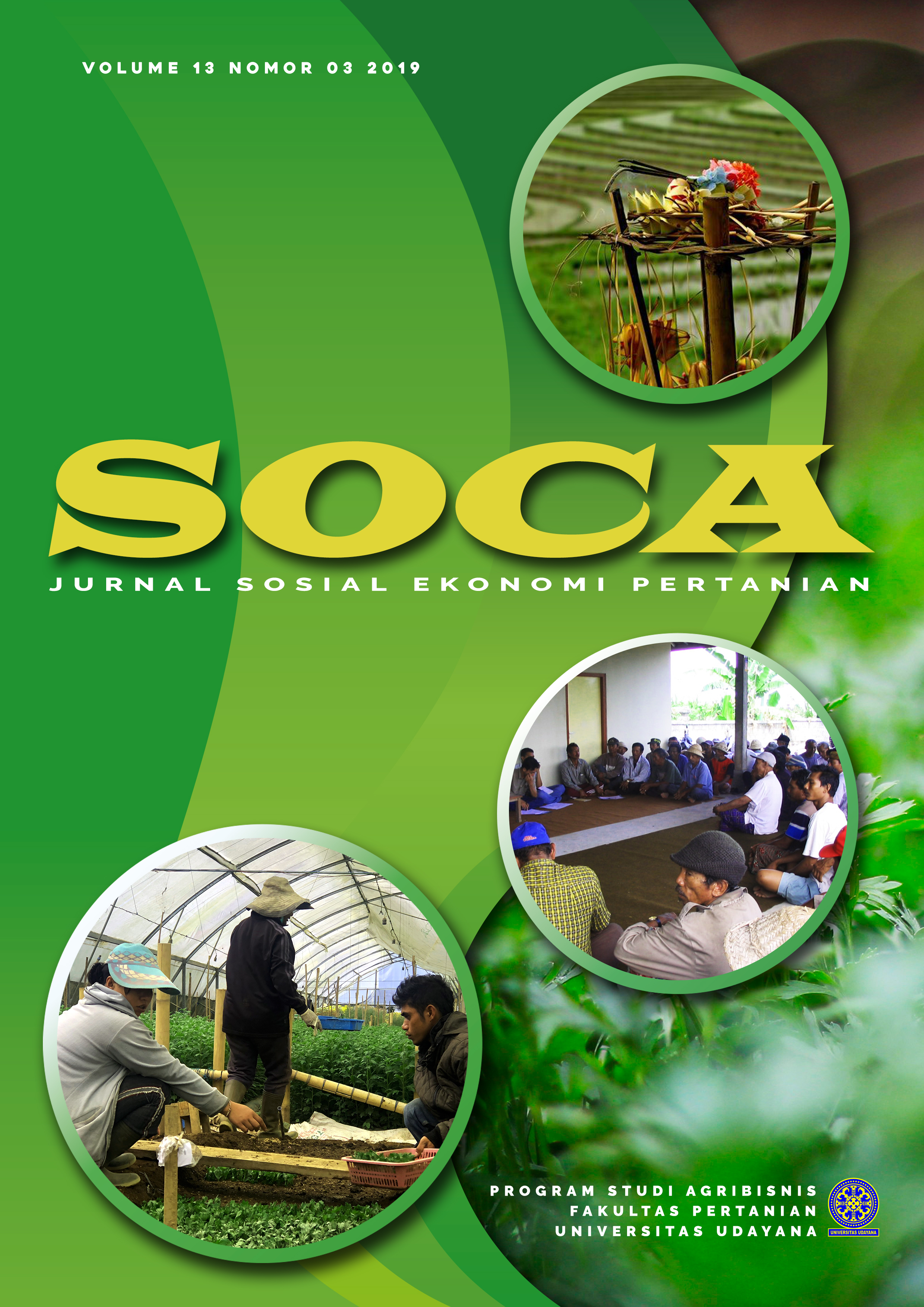ANALISIS NILAI TAMBAH KEDELAI SEBAGAI BAHAN BAKU TEMPE DI DESA ANGKATAN LOR, KECAMATAN TAMBAKROMO, KABUPATEN PATI
Abstract
Agroindustry is one of the important sub-sectors to be developed. The development of agroindustry is expected to be able to absorb agricultural products from farmers. Agricultural products that are still in the form of primary products will be processed into secondary or tertiary products so that they will produce added value. The added value of a product is very important to increase the selling price of the product. The purpose of study are (1) calculate and analyze the value of tempe from the processing process to the consumer's hand, (2) analyze the effect of the amount of soybeans, the price of tempeh and the contribution of other inputs to the added value of tempe. The method used in this study is the census method. Sampling is done by taking all respondents totaling 34 tempe producers through interviews with the help of questionnaires. The added value was analyzed using the Hayami method. Test the difference in tempe value-added ratio using one sample t test. The test of the effect of the amount of soybeans, the price of tempe and the contribution of other inputs to added value using Multiple Linear Regression. Based on the results of the study it can be seen that the added value obtained from the processing of soybeans into tempe is significantly classified as moderate, which is equal to 34.65%. The price of tempe and the contribution of other inputs have a significant effect on the amount of added value of tempe, while the amount of soybeans does not significantly influence. The amount of added value produced shows that the tempe business can be developed. In order to increase the added value of tempe, tempe producers are advised to reduce the contribution costs of other inputs, especially on fuel costs and increase the selling price of tempe.
Downloads
References
Arum, W.P., S. Widjaya, dan L. Marlina. 2017. Kelayakan usaha dan nilai tambah agroindustri tempe. J. Ilmu-Ilmu Agribisnis. 5 (2): 124-133.
Badan Pusat Statistik. 2016. Susenas: Rata-Rata Konsumsi Per Kapita Seminggu Menurut Komoditi Makanan dan Golongan Pengeluaran. Badan Pusat Statitsik Jakarta. Tidak Dipublikasikan.
Engko, C. 2008. Pengaruh kepuasan kerja terhadap kinerja individual dengan self esteem dan self efficacy sebagai variabel intervening. J. Bisnis dan Akuntansi. 10(1): 1-12.
Hayami, Y., K. Thosinori, M. dan M. Siregar. 1987. Agricultural Marketing and Processing in Upland Java: A prospectif from a Sunda Village, Bogor.
Januardie, M. R. 2012. Analisis Nilai Tambah Agroindustri Tempe di Kelurahan Medokan Ayu Kota Surabaya.Fakultas Pertanian Universitas Pembangunan Nasional “Veteran”, Jawa Timur. (Skripsi)
Krisdiana, R. 2014. Penyebaran varietas unggul kedelai dan ekonomi perdesaan. J. Penelitian Pertanian Tanaman Pangan. 33 (1): 61-69.
Maulidah, S. dan F. Kusumawardani. 2011. Nilai tambah agroindustri belimbing manis dan optimasi output sebagai upaya peningkatan pendapatan. Agrise 9(1): 1412-1425.
Purnamasari, D.A. 2017. Analisis Nilai Tambah Industri Rumah Tangga Tempe di Desa Pliken Kecamatan Kembaran Kabupaten Banyumas. Fakultas Pertanian Universitas Gajah Mada, Yogyakarta. (Skripsi).
Putri, A.D. dan N.D. Setiawina. 2013. Pengaruh umur, pendidikan, pekerjaan terhadap pendapatan rumah tangga miskin di Desa Bebandem. J. Ekonomi Pembangunan Fakultas Ekonomi Universitas Udayana. 2(4): 173-180.
Rayandi, D. S. 2008. Panduan Wirausaha Tempe. Buku Kita, Jakarta.
Riduwan. 2010. Dasar-Dasar Statistika. Alfabeta, Bandung.
Salim, E. 2012. Kiat Cerdas Wirausaha Aneka Olahan Kedelai. Penerbit Andi, Yogyakarta.
Soehyono, F., D. Rochdiani, M.N. Yusuf. 2014. Analisis Usaha dan Nilai Tambah Agroindustri Tempe (Suatu Kasus di Kelurahan Banjar Kecamatan Banjar Kota Banjar). J. Ilmiah Mahasiswa Agroinfo Galuh. 1(1): 43-50.
Suprapti, M. L. 2007. Pembuatan Tempe. Cetakan Ke-5. Penerbit Kanisius, Yogyakarta.
Syaifuddin, A. 2013. Strategi Pengembangan Sektor Pertanian Sub Sektor Tanaman Pangan dalam Upaya Peningkatan PBRB Kabupaten Pati. J. Ekonomi Pembangunan. 2 (1): 1-6.
Tambunan, V. dan N. Woyanti. 2012. Analisis pengaruh pendidikan, upah, insentif, jaminan social dan pengalaman kerja terhadap produktivitas tenaga kerja di Kota Semarang (studi kasus Kecamatan Banyumanik dan Kecamatan Gunung Pati). Diponegoro Journal of Economics. 1 (1): 1-11.













